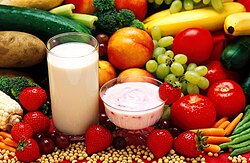**History and Origin of Vegetarianism:**
– Term ‘vegetarian’ first used in early 19th century, popularized by Vegetarian Society in 1847.
– Jain vegetarianism founded in 9th century BCE, closely connected to nonviolence in Indian culture.
– Vegetarianism in ancient Greece from 6th century BCE, re-emerged during the Renaissance.
– Various types of vegetarian diets like ovo, lacto, ovo-lacto, veganism, and more.
– Cultural impact: Linked to religious beliefs, animal rights advocacy, and practiced in ancient civilizations.
**Nutrition and Health Aspects:**
– Vegetarians consume lower fat calories, have lower BMI, and reduced risk of heart diseases.
– Challenges include vitamin B deficiency, need for nutritional balance, and awareness of minor animal ingredients.
– Health research supports positive health outcomes from vegetarian diets.
– Bone health: Vegetarian diet may increase calcium deficiency risk, but infants on lacto-vegetarian diets show normal growth.
– Mortality risk: Reduced all-cause mortality and lower risk of heart diseases among vegetarians.
**Diet Composition and Nutrients:**
– Protein intake tends to be lower in vegetarian diets but can be sufficient with plant sources.
– Iron sources in vegetarian diets, absorption boosted by vitamin C-rich foods.
– Calcium sources include dairy, fortified non-dairy milks, and vegetables.
– Vitamin D sources from sunlight, fortified products, and supplements; importance of choline in vegan diets.
– Fatty acids sources, including plant-based options and supplementation.
**Religion and Vegetarianism:**
– Various religions like Jainism, Hinduism, Buddhism, Christianity, and others advocate or practice vegetarianism.
– Ethics and diet: Vegetarianism as an ideology, influenced by ethical, cultural, and environmental factors.
– Different religious teachings on diet, such as Seventh-day Adventists promoting vegetarianism.
– Baháʼí Faith, Buddhism, Christianity, Hinduism, Islam, Jainism, and Judaism perspectives on vegetarianism.
**Specific Health Research and Concerns:**
– Vegetarian diets under research for potential help in type 2 diabetes.
– Mental health associations with vegan and vegetarian diets, eating disorders, and mortality risks.
– Dietary considerations for bones, diabetes, cardiovascular system, mental health, and eating disorders.
– Detailed information on nutrients like vitamin B, fatty acids, calcium, iron, and protein in vegetarian diets.
Vegetarianism is the practice of abstaining from the consumption of meat (red meat, poultry, seafood, insects, and the flesh of any other animal). It may also include abstaining from eating all by-products of animal slaughter.
| Vegetarianism | |
|---|---|
 | |
| Description | Diet derived from plants, with or without eggs and dairy |
| Varieties | Ovo, lacto, ovo-lacto, veganism, raw veganism, fruitarianism, Buddhist vegetarianism, Jain vegetarianism, Jewish vegetarianism, Christian vegetarianism, Sattvic vegetarianism |
Vegetarianism may be adopted for various reasons. Many people object to eating meat out of respect for sentient animal life. Such ethical motivations have been codified under various religious beliefs as well as animal rights advocacy. Other motivations for vegetarianism are health-related, political, environmental, cultural, aesthetic, economic, taste-related, or relate to other personal preferences.
There are many variations of the vegetarian diet: an ovo-lacto vegetarian diet includes both eggs and dairy products, an ovo-vegetarian diet includes eggs but not dairy products, and a lacto-vegetarian diet includes dairy products but not eggs. As the strictest of vegetarian diets, a vegan diet excludes all animal products, and can be accompanied by abstention from the use of animal-derived products, such as leather shoes.
Vegetarian diets pose some difficulties. For vitamin B12, depending on the presence or absence of eggs and dairy products in the diet or other reliable B12 sources, vegetarians may incur a nutritional deficiency. Packaged and processed foods may contain minor quantities of animal ingredients. While some vegetarians scrutinize product labels for such ingredients, others do not object to consuming them, or are unaware of their presence.
